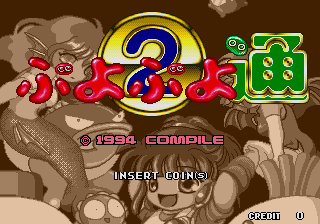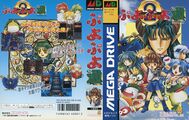Difference between revisions of "Puyo Puyo Tsuu"
From Sega Retro
m (Text replace - "Category:System C Games" to "Category:System C games") |
|||
| Line 104: | Line 104: | ||
===Neo Geo Pocket Color Version=== | ===Neo Geo Pocket Color Version=== | ||
| + | {{ratings | ||
| + | | icon=NGPC | ||
| + | | consolesplus=90 | ||
| + | | consolesplus_source={{num|98|page=134}} | ||
| + | }} | ||
{{Scanbox | {{Scanbox | ||
| console=Neo Geo Pocket Color | | console=Neo Geo Pocket Color | ||
Revision as of 08:16, 3 February 2013
| Puyo Puyo Tsuu | |||||
|---|---|---|---|---|---|
| System(s): Sega System C-2, Sega Mega Drive, Sega Game Gear, Sega Saturn, Neo Geo Pocket Color, Virtual Console | |||||
| Publisher: Compile ( Sega) | |||||
| Developer: Compile ( Sega) | |||||
| Genre: Puzzle, Action (JP box says both; Sega of Japan archive says just Puzzle)) | |||||
| |||||
Puyo Puyo Tsu (ぷよぷよ通) (also known as Puyo Puyo Tsuu and Puyo Puyo 2) is a puzzle game developed by Compile in 1994, initially released for Sega's System C-2 arcade board before being ported to other consoles (such as the Sega Mega Drive, Sega Game Gear, and Sega Saturn). It is the sequel to the Sega/Compile version of Puyo Puyo, whose path the entire series has followed to date.
The standalone game was exclusively released in Japan until 2000, when Sega ported it to the Neo Geo Pocket Color under the name Puyo Pop in the US/Europe (unrelated to the GBA Puyo Pop Minna de Puyo Puyo) — making it the first Puyo Puyo game to be released outside Japan unaltered (and establishing the Puyo Puyo/Puyo Pop naming discretion still used today). It was also included as the Classic mode of Puyo Pop Fever and later rereleased on the Virtual Console's Import section (albeit untranslated).
The Mega Drive version was the first MD game to use the new Saturn-style box layout in the JP region.
Contents
Gameplay
Tsu drops the single-player solo mode of the original MSX Puyo Puyo (kept as a Practice mode in the Sega/Compile version) and brings the focus to competitive gaming. The most important competitive feature added to the sequel is Offsetting, or Sousai, where trash/nuisance puyo (known as Refugee Beans to Dr. Robotnik's Mean Bean Machine players) are not only sent to the opponent when puyo are cleared from the board, but will also be removed from your queue. "Rensa Shibari" allows the players to determine how many chains are necessary to generate trash. "Rule Henka" makes some of your opponent's trash harder to remove and removing your trash more rewarding score-wise. If the currently falling pair of puyo are stuck between two columns of puyo, you can now flip them by pressing ![]() /
/![]() /
/![]() .
.
Furthermore, the single-player story mode was altered. While the story remains the same (you are Arle Nadja and Satan wants to take your pet Carbuncle), the progression of levels has changed. A series of enemies appears on screen and you must choose one at random to fight. Defeating an enemy will lower your "Rest Points." Once all your "Rest Points" have been cleared, you move on to the next level, with newer, harder enemies. The enemies from Puyo Puyo return, however their difficulties have been randomized (for example, Draco Centauros, the weakest normal mode enemy in Puyo Puyo, is now one of the two penultimate-level enemies). Other enemies have also been introduced.
Production Credits
Mega Drive Version
Produce: Moo Niitani
Program: Jemini Hirono, Yasutoshi Akiyama S
Design: Riu.S.Aya
Sound & Voice: Tsuyoshi Matsushima (LMS Music), BA.M (LMS Music)
Manual & Package: Fukusaburo Kido, Sonchoh Sawa
Special Thanks: Kazuhiko Kitade, Kengo Morita (24)
© Compile 1994
Physical Scans
Mega Drive Version
Game Gear Version
Saturn Version
| Sega Retro Average | ||||||||||||||||||||||||||||||||||
|---|---|---|---|---|---|---|---|---|---|---|---|---|---|---|---|---|---|---|---|---|---|---|---|---|---|---|---|---|---|---|---|---|---|---|
|
| 78 | |
|---|---|
| Based on 6 reviews | |
| Saturn, JP (Satakore) |
|---|
Neo Geo Pocket Color Version
| Sega Retro Average | ||||||||||||||||||||||||||||||||||
|---|---|---|---|---|---|---|---|---|---|---|---|---|---|---|---|---|---|---|---|---|---|---|---|---|---|---|---|---|---|---|---|---|---|---|
|
| 67 | |
|---|---|
| Based on 6 reviews | |
- ↑ Consoles +, "Janvier 1996" (FR; 199x-xx-xx), page 114
- ↑ Computer & Video Games, "January 1996" (UK; 1995-12-10), page 44
- ↑ Famitsu, "1995-11-03" (JP; 1995-10-20), page 1
- ↑ Saturn Fan, "1995 12-22" (JP; 1995-12-08), page 78
- ↑ Sega Saturn Magazine, "November 1995" (JP; 1995-10-07), page 195
- ↑ Sega Saturn Magazine, "Readers rating final data" (JP; 2000-03), page 14
- ↑ Arcade, "April 2000" (UK; 2000-03-27), page 100
- ↑ Consoles +, "Mars 2000" (FR; 2000-0x-xx), page 134
- ↑ Computer & Video Games, "March 2000" (UK; 2000-02-16), page 99
- ↑ Game Informer, "October 1999" (US; 1999-xx-xx), page 92
- ↑ Pocket Games, "Spring 2000" (US; 2000-xx-xx), page 43
- ↑ Techno (UK) (+0:00)










